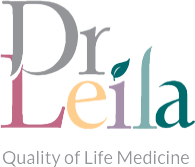Adrenal Fatigue
Purify the Mind and Body

Do you feel exhausted? Burned out? Do you often ask yourself, “Why am I so tired all the time?” Do you crave sugar and caffeine? Do you get frequent cold and upper respiratory symptoms? Gaining weight despite diet and exercise? Do you have muscle and joint pain? Do you feel irritable or anxious and less able to handle stress? You could be suffering from Adrenal Fatigue!
What Is Adrenal Fatigue?
Adrenal fatigue (hypoadrenia) is a condition of the adrenal glands when they are unable to produce the amount of cortisol that our bodies need to function during the day. Cortisol is not only the hormone the body needs during stress, but also one of the primary regulatory hormones for the body.
Cortisol controls the metabolic rate of all of our cells. Adrenal fatigue, also referred to as hypothalamic-pituitary-adrenal (HPA) axis dysfunction, indicates the brain is not sending or receiving signals from the adrenal glands. Many factors can disrupt the signaling between the brain and the adrenal glands, but the most common is prolonged stress. Other factors include too many toxins in the body, lifestyle issues such as lack of sleep, lack of fruits and vegetables, and/or too much sugar, alcohol, and caffeine.
The Story Behind Adrenal Fatigue
The human body wasn’t built for chronic stress, but rather immediate danger. Cortisol causes changes in our bodies to ensure our survival in the face of danger. Imagine a tiger jumping out from behind a bush. Cortisol increases the blood sugar in our bodies to ensure our muscles and brain have the fuel needed to run from the tiger.
Cortisol activates part of our immune system to produce inflammation in case the tiger bites; our blood will clot well so we can keep running. It also suppresses another part of our immune system – the part that helps us fight viruses and cancer; the body isn’t worried about cancer when we are facing a tiger! Additionally, blood flow to our intestines decreases because the body isn’t concerned with digesting and absorbing food in that moment.
While these bodily changes are important for our survival, they exist for short, intermittent periods of time. If cortisol levels are too high or too low for a prolonged length of time, they cause detrimental changes in the body. Consistently increased blood sugar leads to weight gain and diabetes. Chronically increased inflammation leads to numerous medical problems including hypertension, asthma, allergies, arthritis, obesity, and muscle and joint pain. When our natural killer cells are constantly suppressed, we have an increased risk of viral infections, autoimmunity, and cancer. Low blood flow to the intestines over time causes constipation, diarrhea, or an irritable bowel.
In the 21st century, we are facing “tigers” almost daily, such as childhood trauma, relationships, finances, time constraints, job stress, car accidents, and a toxic environment. After years of overproducing cortisol, the adrenal glands can’t keep up. They start to tire and then they don’t produce enough cortisol. Without enough cortisol, we feel exhausted all of the time. We may feel irritable, anxious, or depressed.
Most doctors do not check patients for adrenal fatigue, nor do they know how to properly test for it. Doctors are trained to watch for elevated cortisol levels, but rarely look for low cortisol. The medical community has a distinct bias toward adrenal fatigue. Some doctors assume either your adrenal glands are perfectly fine, or they have ceased to function (a condition known as Addison’s Disease), which lands you in the Intensive Care Unit.
How To Treat Adrenal Fatigue
So many people suffer from adrenal fatigue! The three basic tenets involved in healing our adrenals are:
- Diet and healthy lifestyle changes
- Proper supplementation to give our adrenals the nutrients they need to function properly
- Detoxification of heavy metals
Most people are gluten-sensitive, so a gluten-free diet is best. Gluten increases inflammation and weakens our immune response, leading to leaky gut. Because there is a close link between gluten sensitivity and dairy sensitivity, many people need to remove dairy products as well, especially pasteurized dairy. Sugar, alcohol, and caffeine all drive the adrenals to produce more cortisol in the short term, but deplete the adrenal glands in the long term. Finally, having a nutrient-rich diet full of green leafy vegetables and healthy fats support the adrenal glands ability to function properly.
The Importance of Adequate Sleep
With regards to lifestyle, adequate sleep is an absolute requirement – no less than six, and preferably eight, hours of sleep. People with adrenal fatigue commonly have the most restful sleep between seven and nine in the morning, but often wake up between one and three in the morning. Their adrenals have difficulty producing enough cortisol, so they run out of food stores between these hours when their cortisol is at an ultimate low. The brain wakes them up in an effort to stay alive, as it doesn’t have enough energy to run on. The solution is a high-protein, high-complex carbohydrate snack before bedtime.
Exercise & Meditation
Patients with adrenal fatigue should do only moderate exercises, such as walking, stretching, and yoga. Intense exercise drains the adrenals. Meditation quiets the mind, helps to rest the body, and promotes a more relaxed approach to life’s challenges.
Adrenal fatigue can take several months to over a year to heal. However, it is possible to recover! Good supplementation, lifestyle changes, and detoxification can change your life forever!
Supplements For Adrenal Fatigue
Electrolytes
You must replace your electrolytes when you are adrenal fatigued. Electrolytes drive every intracellular process we have, from absorbing nutrients, to clearing wastes, to producing molecules of energy.
Alfalfa is a green that raises sodium and potassium in an equal ratio.
Dosage: At least 430mg twice daily to start.
You can also replenish electrolytes with sea salt. Unlike table salt, sea salt still has potassium and other minerals. If you are truly eating a diet that is low in processed foods and fast foods, you are probably not getting enough salt. Adding a pinch of salt to water to taste can be a great way to replace electrolytes.
B Vitamins
B vitamins are essential for every cellular process we have. I recommend a B-100mg complex, which will provide 100mg of most of the B vitamins. No B complex provides enough B12, so we need to take extra B12.
Dosage: Roughly 2000 mcg per day for most of us is a good starting place for B12.
DHEA
DHEA is the hormone that backs up cortisol. It is our “stress reserve tank.” While we talk a lot about cortisol, DHEA is actually the more prevalent adrenal hormone. DHEA is used up in stress, and we make less DHEA as we age. We can replace DHEA by taking the over-the-counter supplement. Men can take regular DHEA. Women, however, should take a metabolite of DHEA called 7-Keto DHEA. This will stay as DHEA in the body, rather than converting to other hormones like estrogen and testosterone.
Dosage: Men: 50-100 mg per day; Women: 100-200 mg per day of 7-keto DHEA.
Adrenal Gland Adaptogens
Adrenal gland adaptogens help to boost your adrenals when they are running low, and calm your adrenals when you are running too high. They help to mitigate the emotional effects of stress. Adrenal gland adaptogens include:
- Niacinamide 500mg twice daily to help balance brain waves and reduce “overthinking” during stress.
- L-theanine 200mg twice daily helps to calm us without making us tired. Theanine induces alpha waves in the brain. Beta waves are the brainwaves we create when we are doing, thinking, and working hard. Alpha waves are those calm, creative brainwaves we make when we are on vacation. Theanine can help with physical problems related to stress, such as neck and jaw pain.
- Relora is a proprietary blend of magnolia and phellodendron. It helps with feeling like life is too busy.
- Rhodiola is an herb that helps to protect the brain and the body from the effects of prolonged stress. It lowers cortisol when it is too high, and can help lower the inflammation associated with cortisol being too high or too low.





